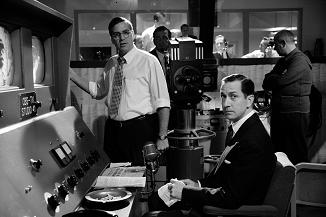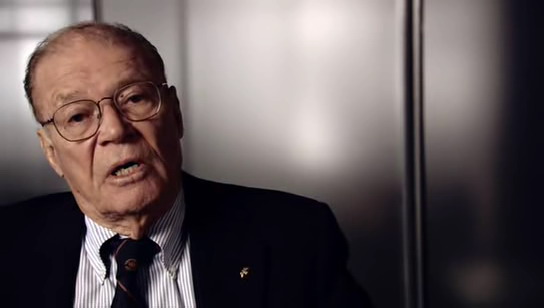 The first pic from Goodnight & Good Luck, George Clooney’s forthcoming film about Edward Murrow’s televised unmasking of Joe McCarthy, is now online. The cast includes Clooney (Fred Friendly), David Strathairn (Murrow), Frank Langella (Bill Paley), Patricia Clarkson, Jeff Daniels, and Robert Downey, Jr.
The first pic from Goodnight & Good Luck, George Clooney’s forthcoming film about Edward Murrow’s televised unmasking of Joe McCarthy, is now online. The cast includes Clooney (Fred Friendly), David Strathairn (Murrow), Frank Langella (Bill Paley), Patricia Clarkson, Jeff Daniels, and Robert Downey, Jr.
Category: Truman to Eisenhower
The Blackness of Space.
“It was a different time, 1957 or ’58. America’s love affair with racism was in full swing. NASA was no exception.” Ted at The Late Adopter sends along a sordid tale of cosmic achievement and racial injustice in this award-winning documentary on The Old Negro Space Program, a film not by Ken Burns.
Requiem for a Diplomat.
R.I.P. George Kennan 1904-2005. The nation has lost one of its senior diplomatic statesmen, at a moment when men and women of his wisdom, judgment, and foreign policy experience are needed in the public arena more than ever. He will be missed.
MLK 2K5.

“Darkness cannot drive out darkness; only light can do that. Hate cannot drive out hate; only love can do that. Hate multiplies hate, violence multiplies violence and toughness multiplies toughness in a descending spiral of destruction. The chain reaction of evil…must be broken, or we shall be plunged into the dark abyss of annihilation.“
— Martin Luther King, Jr (1929-1968)
Eyes on the Prize.
A sheriff’s deputy stumbles upon an impressive collection of civil rights mugshots in a Montgomery, Alabama basement.
Not yet overcome.

“We conclude that, in the field of public education, the doctrine of ‘separate but equal’ has no place. Separate educational facilities are inherently unequal.” As Brown v. Board turns 50, segregation persists, such that America’s schools are now barely as integrated as they were in 1969. Let’s get it together, y’all.
Justice Delayed.
Almost fifty years after his brutal murder for whistling at a white woman, the Justice Department reopens the case of Emmett Till.
No Tenure for You.
Sean Wilentz reviews trained historian Condoleeza Rice’s sense of her field in light of her recent testimony, and finds her wanting. Notes Wilentz, “The American Historical Review’s notice of her first book, a study of Russia and the Czech army after 1948, charged that Rice ‘frequently does not sift facts from propaganda and valid information from disinformation or misinformation’ and that she ‘passes judgments and expresses opinions without adequate knowledge of the facts.’)” Well, dang, no wonder the Bushies jumped on hiring her for National Security Advisor…she sounds like a great fit.
MLK.

“Our lives begin to end the day we become silent about things that matter.“
– Dr. Martin Luther King (1929-1968)
Foggy Winter.

If you can stand being bombarded by endless slo-mo shots of dropping ordnance set to a Phillip Glass pulse, The Fog of War, the new Errol Morris documentary about and extended interview with former Secretary of Defense Robert McNamara, makes for an interesting evening out. Despite the heavy saturation on screen, there are no real historical bombshells dropped here — The movie doesn’t aim to muckrake a la The Trials of Henry Kissinger, and the picture you get of Vietnam-era McNamara is the same one you’d find in a book like Robert Schulzinger’s A Time for War: Publicly optimistic, McNamara seems deeply cognizant from early on that Vietnam will be a quagmire, but he — like LBJ and almost all of the foreign policy establishment — are too blinded by the fear of falling dominoes to consider withdrawal as a viable option. (McNamara does add fuel to the fire here that Kennedy wanted a full withdrawal by 1965. I guess if anyone would know, he would, but the books I’ve read don’t really bear this out.)
Nor do we ever seem to get under McNamara’s skin here — he remains intelligent and composed throughout, deflecting the tougher questions about Vietnam with a practiced ease. Still, McNamara, a surprisingly spry 86, does offer us some intriguing (and occasionally self-serving) reminiscences here about his experiences in the corridors of power, from his assessment that the Cuban Missile Crisis was defused mainly by simple, dumb luck to his thoughts on the morality of civilian fire-bombing, which he efficiency-maximized for Curtis LeMay during WWII.
As a documentary, The Fog of War sometimes gets clouded by its own cinematic devices — to take just one example, there’s a shot of dominoes across a map of Asia that is striking at first but fast becomes overused. And the continual Phillip Glass cascading over falling bombs and rushing people had me thinking of Koyaanisqatsi outtakes a lot of the time. In sum, the film works best when it’s simply an engaging monologue by an intelligent, evasive, and often frustrating Cold Warrior as he muses over a life perhaps not-so-well lived.
